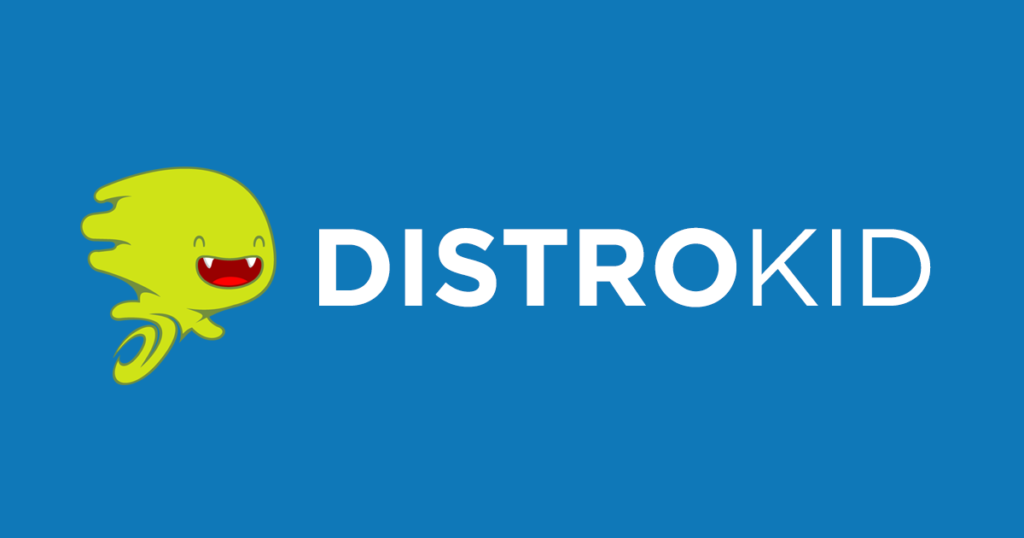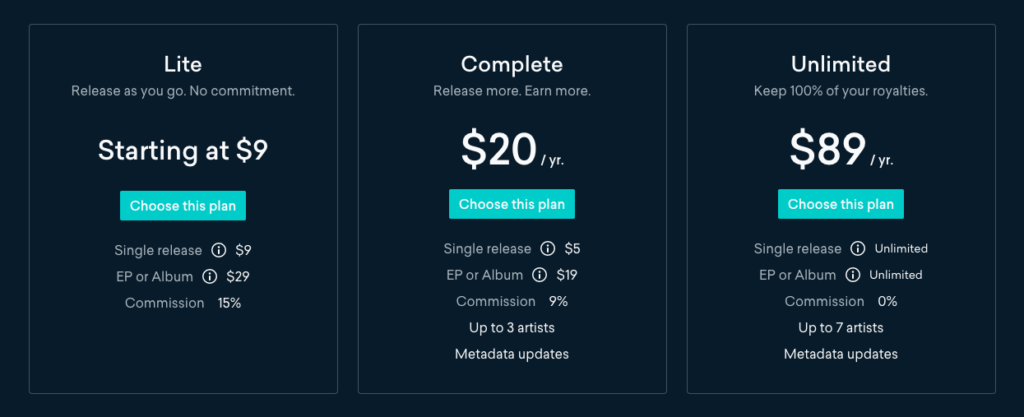Picking the right company to release music to streaming platforms and digital stores is often an extensive task. With lots of points that must be taken into account, such as pricing, delivery time, and commission, it is not an easy decision to make for most artists.
That’s why today, we bring you a comparison between two of the most popular music distribution services: LANDR vs DistroKid. We will compare all of the key features you will find on these platforms and discuss how each of them will benefit your music career.
We’ve picked these two providers to review because they have a great reputation and lots of positive feedback. LANDR is especially known for its automated mastering feature; And DistroKid has very attractive pricing compared to other distribution tools.
After you’re done reading this guide, we also recommend that you take a look at our Best Music Distribution article to learn about other companies.
Quick Introduction: LANDR & DistroKid

LANDR is an all-in-one music solutions platform. Apart from being an excellent music distributor, the company offers a wide variety of extras including their famous A.I. music mastering service, an ever-growing sample catalog, and LANDR Sessions, a tool for collaborating with fellow musicians online.

DistroKid is one of the biggest names in the music distribution game. A preferred Spotify distributor, the company will distribute as many songs as you’d like to all the major platforms and streaming services for a yearly paid value.
LANDR vs DistroKid – In-Depth Review
Table of Contents
- Ease of Use
- Pricing
- Streaming Services and Stores
- Delivery Time
- Commission
- Playlist Pitching
- Analytics
- Additional Services
- Referral Programs
- Customer Service
Ease of Use
Digital music distribution is a breeze with both platforms, but we’ve found DistroKid to have the most streamlined process. There’s only one drawback: you have to pay upfront to have access to the platform so there’s no way to see how it works before you spend your money.
LANDR, on the other hand, lets you get a feel of what the process feels like before you commit to a paid plan. Still, due to the large number of additional services that the website offers it is not as focused as DistroKid.
Pricing
LANDR

There are three options of music distribution plans with LANDR: Lite, Complete and Unlimited. Different from DistroKid, which supplies you with unlimited releases, LANDR charges you per single/album, except with the unlimited distribution plan.
The major difference between the plans is the commission the platform will take over your royalties: 15%, 9%, and 0%, respectively; And the number of artists you’re able to release with each option: one, up to three, and up to seven.
DistroKid

DistroKid offers three distinct plans. All of them will let you upload unlimited songs for one yearly price. The Musician plan is great for solo artists: at $19.99/year it stands among one of the cheapest music distribution options in the industry.
However, the most basic plan won’t let you have a lot of features that we consider to be very important for any artist, for example, customizable release date and daily sales stats. This is a major drawback.
For that reason, we recommend spending a little more and going straight with the Musician Plus plan.
The Label one is, obviously, for labels that are managing a lot of acts. This plan offers five options depending on the number of artists that are going to be released, as you can see in the image below:

Tip: See how Distrokid performs against Amuse distribution in our Amuse vs DistroKid article.
Which One is Cheaper?
In the long run, DistroKid will be cheaper. LANDR is a bit higher-priced than most other music distributors, even with the Unlimited plan. Another great feature from DistroKid is that you have the option of splitting the payment of the plan with your band members.
LANDR’s price is justifiable if you plan to use their additional services, such as the A.I. mastering, samples library, or Sessions – a tool for collaborating with other artists online – even though these are priced separately.
Streaming Services and Stores
LANDR claims to release music to more than 150 stores and platforms, including the most popular ones such as Spotify and Apple Music.
DistroKid, currently, will distribute to 31 major platforms plus other services via their partnership with MediaNet.
It seems that LANDR distribution focuses on getting your music to the most outlets possible including smaller and niche ones while DistroKid leans toward quality over quantity. Based on this factor, the choice will ultimately come down to each artist’s priority.
Delivery Time
Both music distribution services are very fast when it comes to getting your own music online. Releases will be reviewed by DistroKid in a couple of days (the company doesn’t specify an exact timeframe). LANDR, however, states that all releases are reviewed within two business days.
We recommend artists to send their songs to music distribution services at least two weeks prior to the planned release date. That way, the song will go live on all the streaming platforms and digital stores at the same time.
Commission
It is important that artists consider how much the music distribution platform will take from their songs’ profits. DistroKid wins this one because you get to keep 100% of your royalties. The company only charges a commission if you use their YouTube monetization tool, where they will keep 20% of the revenue from claimed videos.
LANDR has a progressive commission system that depends on the plan: 15% for the Lite option, 9% for Complete, and 0% for Unlimited.
Playlist Pitching
Many digital distribution platforms offer music promotion opportunities and services for their artists. DistroKid has several Spotify playlists that are updated with the best-voted tracks weekly, as well as a feature called Wheel of Playlist, where you spin a prize wheel and get your track added to their playlist in the position that it lands.
LANDR doesn’t offer any playlists on their side, but they have a wide range of marketing tools for artists to use free of charge, such as customizable promolinks to post to your social media and pre-saves.
Analytics
Analytics are very important to know how your music is doing. Both companies offer detailed stats and insights about your releases including streaming and download numbers. However, with DistroKid, daily sale stats are only available with the Musician Plus and Label plans.
Additional Services
DistroKid prefers to focus on just music distribution, but they still offer some basic extras such as promotion tools and their YouTube Content ID system: a tool that will automatically search for and claim monetization on videos utilizing your music.
LANDR offers a wide range of additional services, including:
- A.I. Music Mastering: a tool that will automatically master your songs based on artificial intelligence.
- Samples: a vast sample library where you can download sounds for your next work.
- Sessions: a tool for collaborating with other artists, offering both free and paid.
The only drawback is that LANDR’s additional services are all charged on their own, so prices may quickly add up.
Bonus: Is LANDR Mastering Worth It?
For as low as $6.58, LANDR will master your song automatically using artificial intelligence. In our opinion, the service may work well for some tracks and not so great for others. The company offers a free trial so we recommend that you do try before committing to a plan.
Referral Programs
Referral programs are a win-win scenario: you get to help others with earning a few bucks. DistroKid’s affiliate program will give you $10 per customer that you bring to the platform while giving your guests 7% off their first year of membership.
Similarly, LANDR will also give $10 both for you and your invited artist. However, the company limits the number of referrals to ten per person and it is only available in the US.
Customer Service
A fast and reliable customer service is important for any service you’re working with. The DistroKid release process is very automated so if you run into a problem with their platform it may take a while to get a response. LANDR customer service has lots of positive reviews, with the average time of response being 1 to 2 days.
Tip: Also consider checking our DistroKid vs CDBaby article.

Verdict
LANDR
Pros
- Lots of extras such as the A.I. mastering service.
- Collaboration tools via the Sessions service.
- Fast review time, averaging two business days.
- Fast customer service according to reviews.
- Better stats and insight tools compared to DistroKid.
- One-time fee to release cover songs.
Cons
- High price.
- Complex pricing tiers – not as easy to understand as with DistroKid.
DistroKid
Pros
- One of the best prices in the digital music distribution game, starting at a $19.99 yearly fee.
- Unlimited releases with all the plans.
- Discounts for record labels managing a large number of artists.
- More streamlined process compared to LANDR distribution.
- Easy cover song licensing
Cons
- Some hidden fees. For example, you have to pay extra ($0.99) to get your music into Shazam.
- The daily stats are only available for the Musician Plus and Label plans.
Both platforms are very good at what they propose. DistroKid is one of the most affordable distribution companies in the music industry. We recommend though that you go straight with the Musician Plus plan if you choose this provider: as we discussed before, the cheaper option cuts out important features such as customizable release date and daily stats.
While LANDR provides excellent extras such as their A.I. mastering services and collaboration tools, all of them are charged apart from the music distribution plan (which is already expensive). For that reason, we consider DistroKid to be the best all-around option.We hope you found this guide helpful. Please check our relatedarticles for more comparisons between different music distribution companies. Don’t hesitate to contactus if you have any further questions or would like to discuss further!
Ian Sniesko is an experienced music producer and musician who loves to share his knowledge about the best audio equipment for making and enjoying great music. For the past 6 years, Ian has written extensively about the audio equipment industry and has contributed to many of the top music magazines.